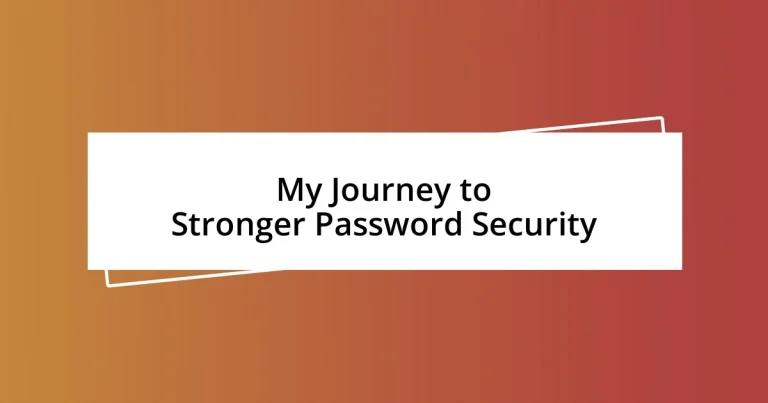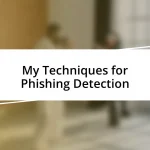Key takeaways:
- Strong passwords are essential for protecting personal online accounts; complexity, uniqueness, and regular updates are crucial for effective security.
- Implementing two-factor authentication (2FA) adds a significant layer of security by requiring additional verification beyond just a password.
- Utilizing password managers can streamline password management, allowing for complex and unique passwords without the need for memorization.
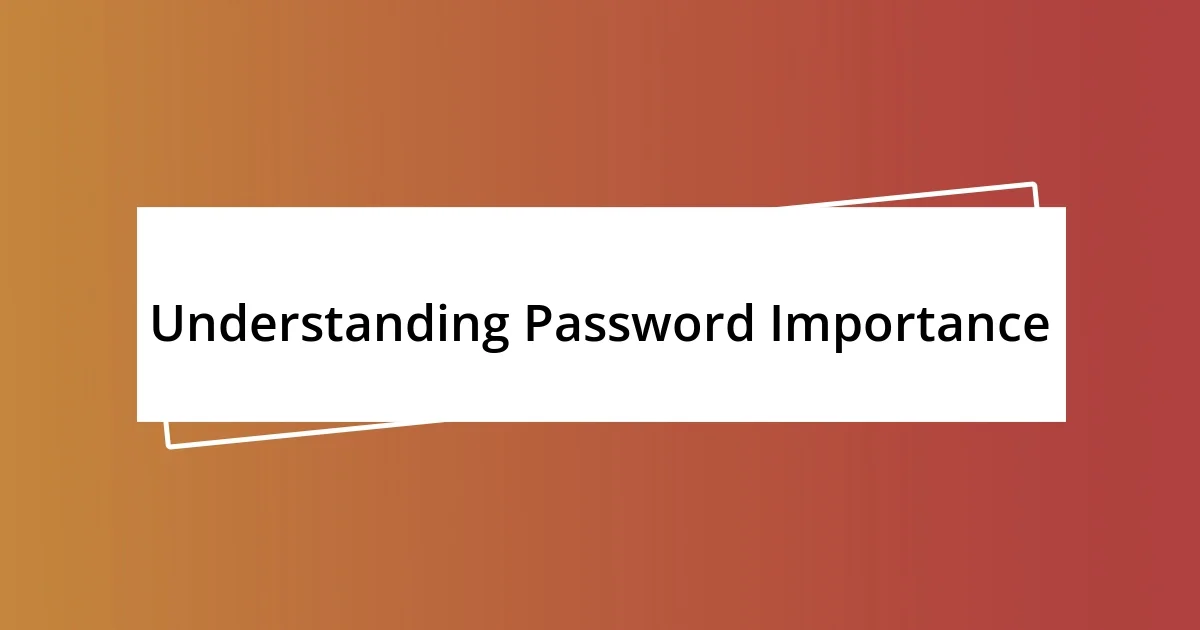
Understanding Password Importance
Passwords are like the keys to our most personal spaces online. I remember when a friend of mine got their account hacked because they used “123456” as their password. It hit me that such a simple thing could lead to such a significant breach of privacy. Isn’t it alarming how many of us underestimate the strength of our passwords?
Beyond the technical side, there’s an emotional weight to password security. It can feel overwhelming when you think about all your accounts—banking, social media, shopping—tied to just a string of characters. I often wonder, what would happen if an identity thief exploited that weakness? The thought alone makes me double-check my passwords and consider unique and complex combinations.
As we rely more on digital platforms, understanding the importance of strong passwords becomes vital. I’ve learned that a complex password isn’t just a collection of random characters; it’s a barrier protecting my data and identity. With the rise in cyber threats, don’t you think it’s time we all took password security a bit more seriously?
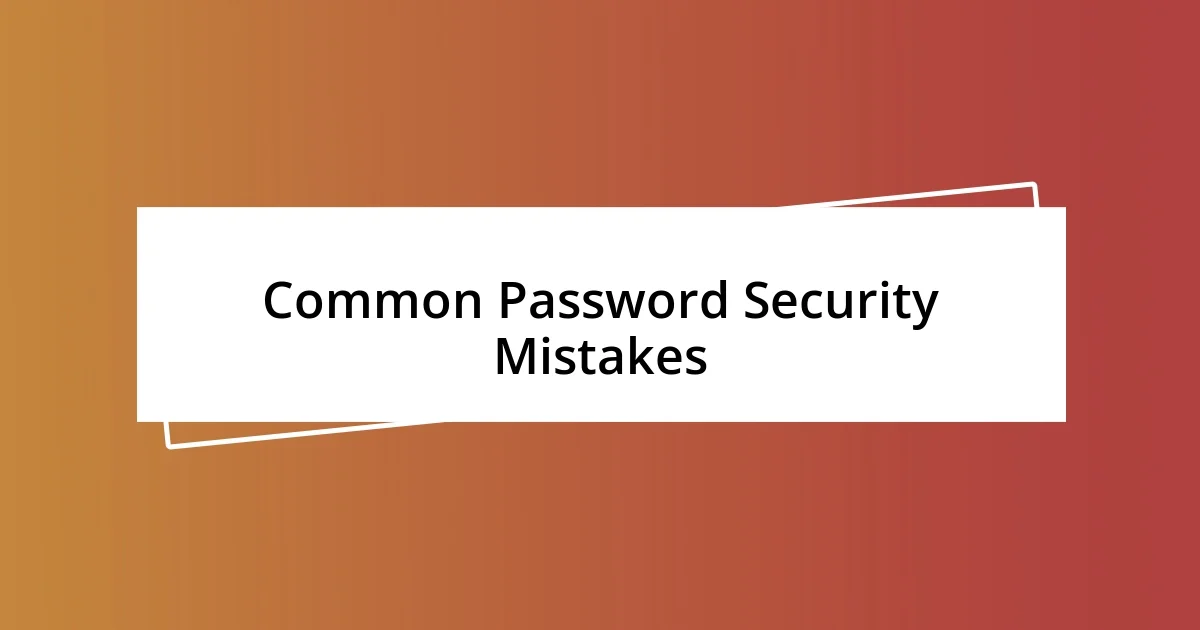
Common Password Security Mistakes
Using weak passwords is a common mistake that I’ve made in the past. I remember a time when I thought using the name of my pet combined with my birthday was clever. Sure, it felt personalized, but in reality, it was highly predictable. It’s surprising how many people do similar things, thinking they’re being unique when they’re just leaving the door wide open for hackers.
Another common pitfall is reusing passwords across multiple sites. I once had a single password that I used for almost everything. The day I learned about a major data breach was a wake-up call. I realized that when one account is compromised, it makes it too easy for attackers to access others. It’s like using the same key for every lock you own—eventually, someone might just find that key.
Finally, ignoring updates to password practices is a huge mistake many people make. The online security landscape evolves constantly, but I’ve noticed that some friends stick to outdated methods, thinking they’re safe enough. When I adopted two-factor authentication, it felt like adding an extra layer of security, and it’s something I wish I had done sooner. Isn’t it time we re-evaluate how we approach our password security?
| Error | Description |
|---|---|
| Using Weak Passwords | Choosing easily guessable passwords, like birthdays or names. |
| Reusing Passwords | Using the same password across multiple accounts. |
| Ignoring Updates | Failing to adopt newer security practices, such as two-factor authentication. |
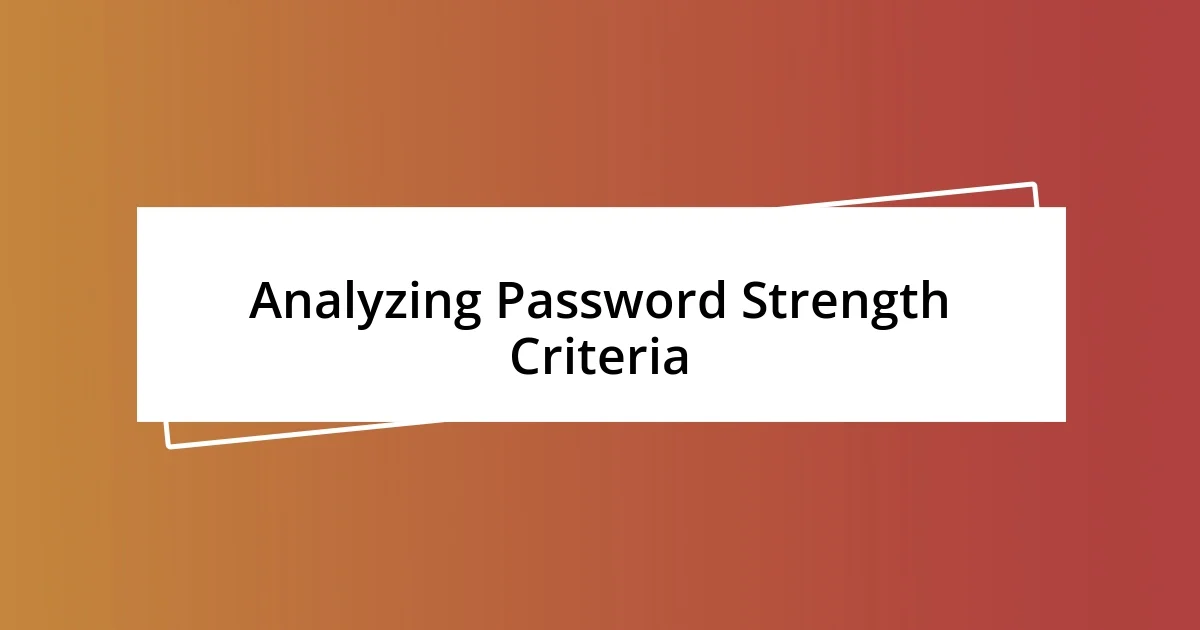
Analyzing Password Strength Criteria
When I started diving into password security, I quickly realized that password strength is not just about length but also complexity. For instance, a combination of uppercase letters, lowercase letters, numbers, and special characters significantly increases your password’s defenses. I remember crafting my first ‘strong’ password; it felt almost like solving a puzzle, and the satisfaction of finally securing my accounts was rewarding.
To analyze password strength effectively, I now consider these criteria:
– Length: Longer passwords are typically stronger; aim for at least 12 characters.
– Complexity: Include a mix of character types—letters, numbers, and symbols.
– Unpredictability: Avoid common phrases or sequences that can be easily guessed or cracked.
– Uniqueness: Each password should be distinct for different accounts to limit risk exposure.
Another aspect of password strength that stands out to me is the emotional connection we form with our passwords. I recall the first time my security was compromised; it felt like a personal violation. I had relied on a password I thought I could remember easily, but it turned out to be a downfall. Now, I consciously choose passwords that are not just memorable but also shield my online persona.
Evaluating your passwords based on these factors can lead to better security:
– Passphrases: Consider using phrases that are both meaningful and complex.
– Biometric Options: Use fingerprint or facial recognition for an added layer.
– Password Managers: These tools can generate and store complex passwords, eliminating the need to remember all of them.
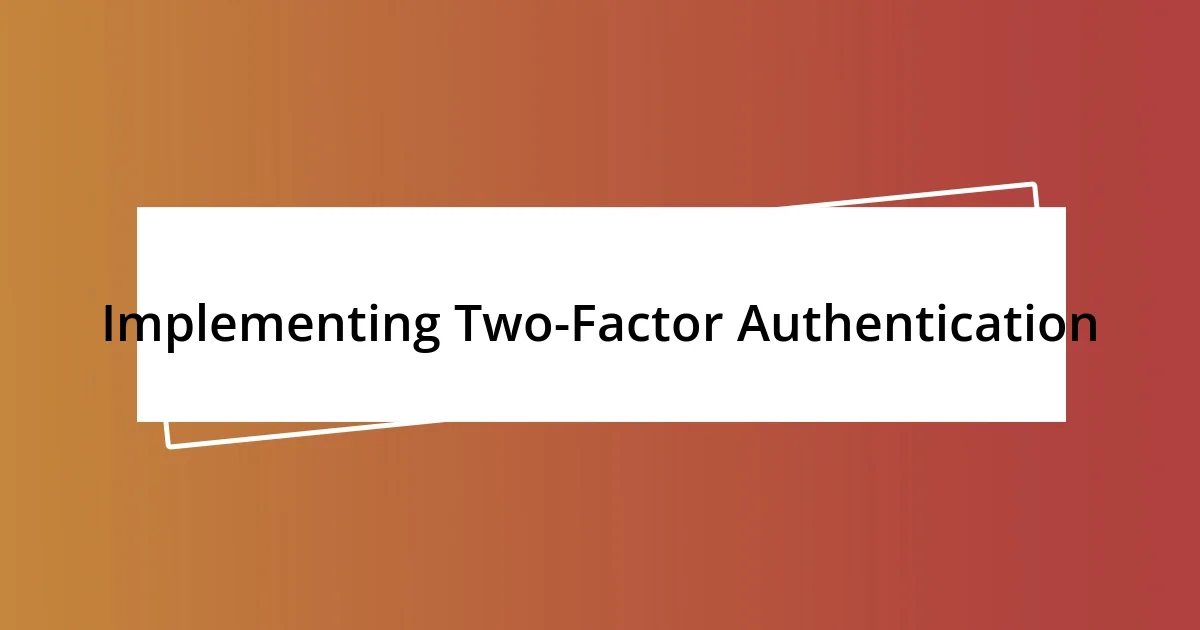
Implementing Two-Factor Authentication
Implementing two-factor authentication (2FA) was a game changer for me. The first time I set it up, I felt a sense of pride—almost like I was installing a security system in my own home. This extra layer requires not just my password but also a second form of verification, such as a text message or an authenticator app. It always amazes me how something so simple can make such a significant impact on my online security.
One afternoon, I remember being in a rush, trying to access my email on a public Wi-Fi connection. When prompted for my 2FA code, I was momentarily frustrated, thinking it was a hassle. But then I realized that this extra step protects me from snoopers who might be lurking around—especially in a coffee shop filled with strangers. That moment reinforced my belief that a slight inconvenience is a small price to pay for the protection of sensitive information.
I often ask myself, “Why aren’t more people using 2FA?” Many of my friends still see it as an unnecessary step. However, when I shared how 2FA caught a login attempt from another country, they started reconsidering their security practices. The peace of mind I get knowing my accounts are better defended is priceless. Wouldn’t you want that kind of security for your digital life too?
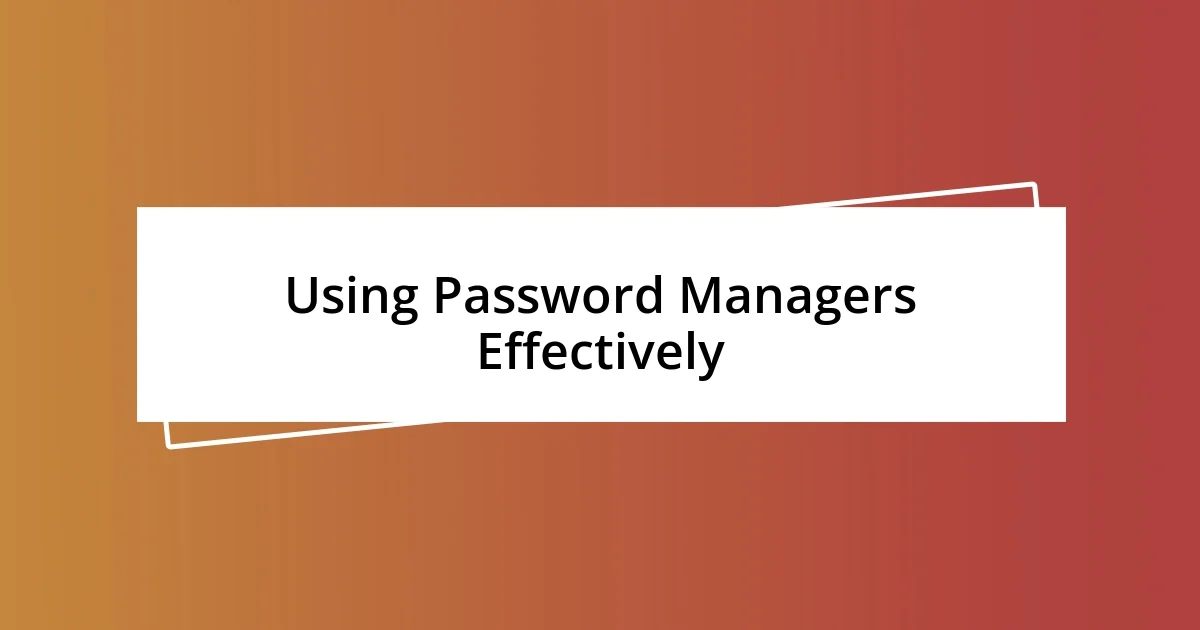
Using Password Managers Effectively
Using a password manager has completely transformed how I handle my online security. Initially, I was skeptical about storing my passwords in one place; it felt like putting all my eggs in one basket. But then I had a moment of clarity. I realized that a reputable password manager not only securely encrypts my passwords but also generates complex ones automatically. This made my life so much easier—no more trying to remember which passwords were for which accounts or recycling the same tired ones!
One day, while setting up my password manager, I felt a wave of relief wash over me. I deleted a long list of unoriginal passwords scribbled on sticky notes that cluttered my desk. It was like freeing myself from a digital burden. I can confidently access my accounts without worrying about whether I’ve used ‘Password123’ again. How liberating is that? Additionally, I’ve noticed that being able to autofill my passwords on websites has streamlined my online experience; it’s a game changer!
I often remind myself that even with a password manager, vigilance is key. I actively check for data breaches affecting my accounts, and whenever alerts pop up, I’m struck by an adrenaline rush—part fear, part empowerment. The integration of my password manager with two-factor authentication enhances my security further, giving me peace of mind. Isn’t it fascinating how technology can work in our favor when we use it wisely? Having robust password security is no longer just about protecting myself; it’s about embracing a proactive approach to my digital life.
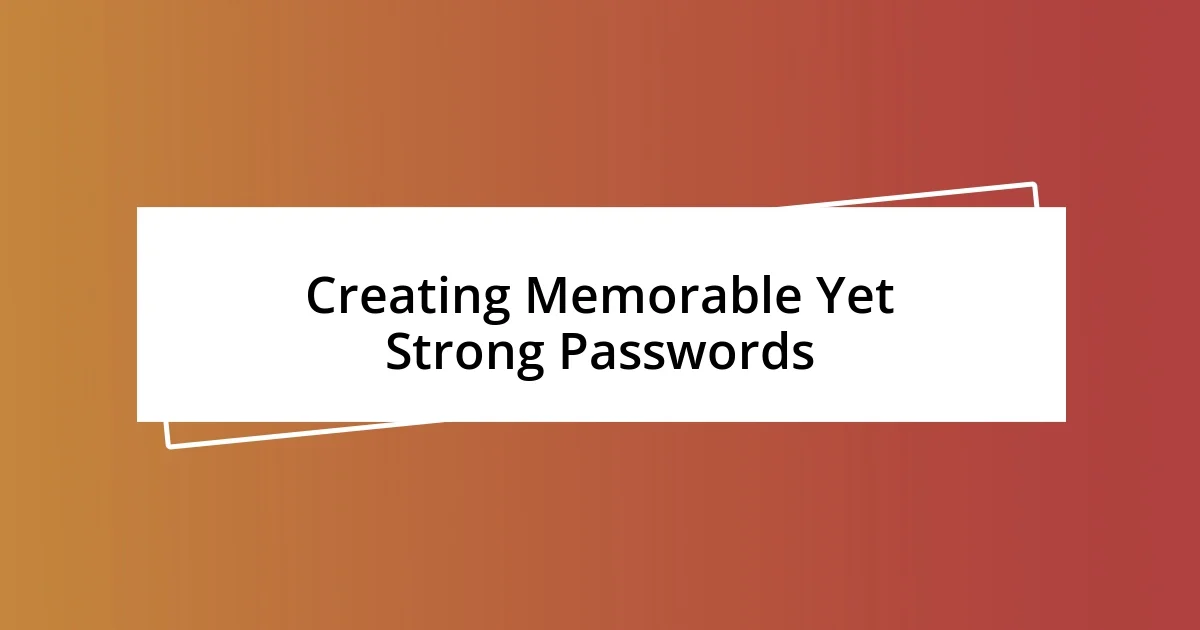
Creating Memorable Yet Strong Passwords
Creating memorable yet strong passwords has been quite a journey for me. At first, I thought using simple words with added numbers would suffice, but I quickly learned the hard way that these passwords were easy targets for hackers. I started crafting passwords based on phrases that held personal significance—lyrics from my favorite songs or quotes from inspiring books. It felt satisfying to know that these passwords weren’t just strong but also meaningful to me.
One night, while waiting for my dinner to arrive, I experimented with creating a password that mixed elements from my life. I combined my childhood pet’s name with the street where I grew up and added a couple of symbols. Not only was it a secure choice, but it evoked fond memories each time I logged in. Who knew I could feel a little nostalgia while typing a password? It’s fascinating how weaving personal connections into password creation can make them more memorable.
Over time, I began to appreciate the art of password creation—a blend of simplicity and complexity. I often ask myself, “How can I make this even more secure without losing its memorability?” To simplify my process, I now use a strategy of changing one key element of my chosen phrases regularly. This approach keeps my passwords fresh yet still tied to meaningful memories. Have you thought about how the right strategy can enhance not only your security but also your connection to your online identity?
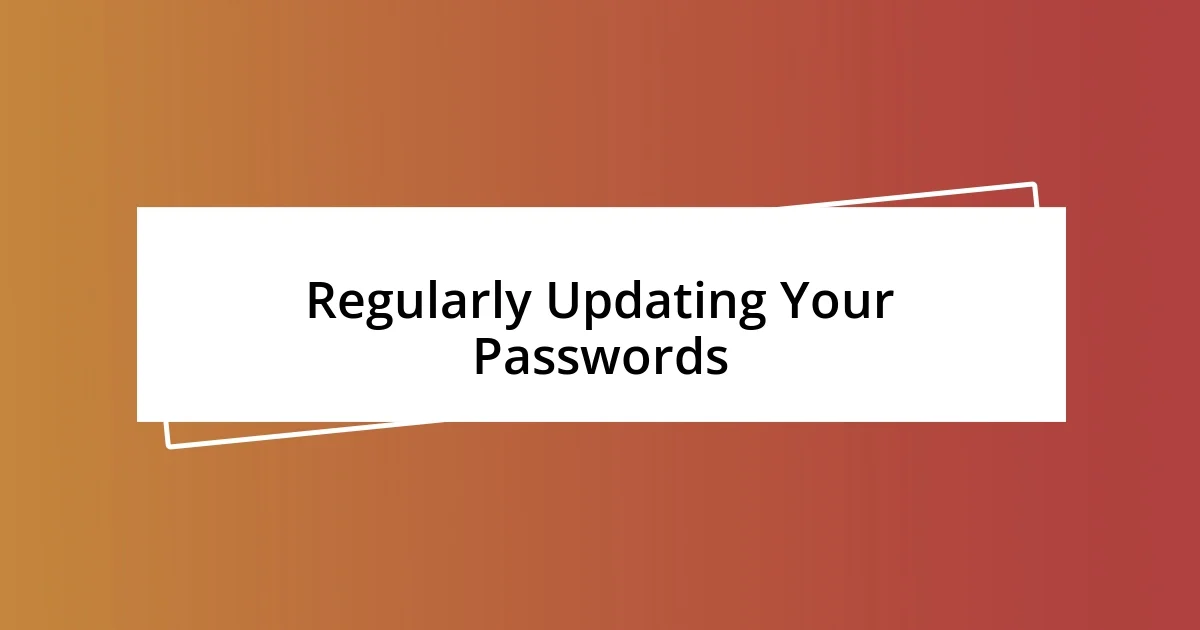
Regularly Updating Your Passwords
Regularly updating passwords is a practice that I’ve come to prioritize in my online security routine. Initially, I found it tedious, often pushing it to the backburner of my to-do list. However, after experiencing a minor security scare, I learned the hard way that keeping my passwords fresh is non-negotiable. It’s like changing the locks on your house every now and then for peace of mind—changing the password boosts my confidence knowing that I’m staying one step ahead of potential threats.
I remember the first time I set a reminder in my calendar to update my passwords every three months. At first, it felt cumbersome, and I resisted the change. But then I discovered this little ritual became almost therapeutic for me. Each time I refreshed my passwords, it felt like a mini digital spring cleaning. I’d sit down with a cup of coffee, reflect on the accounts I use most often, and craft new passwords that are not only secure but also imbued with a sense of renewed clarity. Isn’t it interesting how a simple act like changing your password can spark those feelings of renewal?
Beyond the process, I’ve started associating password updates with personal goals. For instance, I now review my passwords around the time I set my New Year resolutions. It acts as a reminder not just to secure my online presence but to reflect on my personal growth too. Have you ever thought about blending these tasks into something more meaningful? It’s a small change that can transform mundane digital habits into an engaging and rewarding experience.












